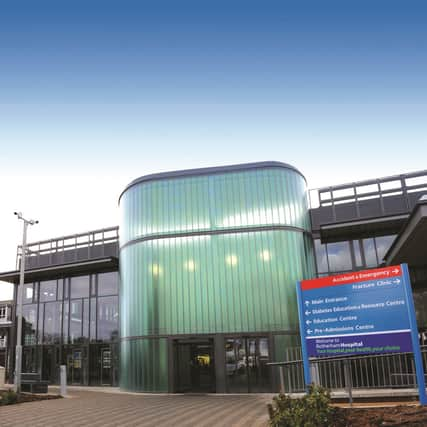OAP in ‘agony’ had to wait 18 hours at Rotherham A&E


A “FRAIL” wheelchair-bound elderly woman was left “in agonising pain” waiting for more than 18 hours overnight in A&E to be seen, according to her ‘heart-broken’ daughter.
Grandmother Patricia Heyes (76) was at one point “crying down the phone” to daughter Abby Heyes while she sat in the busy Rotherham Hospital A&E department, “scared” by “the drunks coming in”.
Wheelchair-bound Mrs Heyes, who suffers from fibromyalgia and arthritis, had been told to go to A&E after being visited by a nurse at her home in Swinton due to swelling in her feet on Friday, March 18.
“The nurse advised she go to A&E immediately as she had no blood supply in all her toes,” said daughter Ms Heyes.
“The nurse said mum would be seen almost immediately due to the nature of her condition.”
Mrs Heyes, who used to work as a medical secretary at the hospital, arrived at Rotherham A&E at 6pm and was told the waiting time was five hours.
“I could sit with my mum for an hour but was then asked to leave due to Covid regulations, which I understood,” said Ms Heyes (46), also of Swinton.
“The department was full. I got mum a sandwich and drink from M&S and left her — she looked so frail.
“I first rang my mum at 10pm and she had not been seen. I rang again at 11pm and she was scared.
“She said: ‘There’s these drunks coming in’. No-one had spoken to her and she was still sat in her wheelchair.
“She was crying to me down the phone saying she wanted to come home, she was in agonising pain and the swelling to her feet was getting bigger.
“She was too weak to get the lid off the lemonade I got her, and I reassured her I would get someone to do this for her.
“I rang and asked if I could get a taxi and sit with her saying I had a negative lateral flow test but they said they couldn’t allow that which I understood given the conditions we’re living in.
“I asked if someone could loosen the lid off her pop as she was extremely dehydrated and had drunk one cup of tea all day. A member of staff said they would get a nurse to do this.
“I kept ringing my mum, so she had someone to talk to and didn’t feel vulnerable. It was very difficult as she was crying all the time.
“At 1am, no-one had been to see her or loosened the lid to her drink. Staff told me they didn’t know how long she would be waiting and the waiting time had gone up to seven and a half hours. I begged them to give her a drink.
“At 3am, she was still sat there, her bloods had been taken but she was still waiting to see a doctor.
“No blanket or cup of tea had been offered.”
Ms Heyes said by 12.15pm the following day her mum had still not been assessed by a doctor, but she had been moved onto a ward.
She remained in a normal chair, however, as no beds were available, and another set of blood tests were taken.
“She was left alone with no treatment, not even pain relief to ease her,” said Ms Heyes.
“This is neglect of an elderly person with medical issues.
“My mum spent 30 years of her life working at Rotherham Hospital as a medical secretary and gets treated like this.”
Mrs Heyes was finally seen after 21 hours after first going to the hospital, advised on her medication and referred to a vascular surgeon.
She also received two scans before being discharged at 5.40pm.
“The ordeal she went through has left her even more scared of becoming ill and needing hospital treatment, added Ms Heyes.
“It is heart-breaking when someone who has dedicated all her life to the NHS and at a time when she needs them, they cannot support her.”
A spokesperson for Rotherham NHS Foundation Trust said: “We are very sorry to Mrs Heyes and anyone else who may have waited longer than we would wish when visiting our Urgent and Emergency Care Centre.
“Over recent weeks, we have seen increased attendances and a high number of patients requiring admission to hospital. We prioritise patients who have urgent or life-threatening conditions but work hard to ensure waiting times are kept to a minimum wherever possible.
“Patients are streamed to a variety of specialities as required, therefore, some patients may experience longer waits than others depending on their care requirements.
“Whilst we are unable to comment on individual circumstances, we will be contacting Mrs Heyes directly to apologise.”